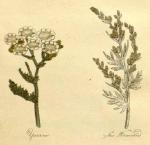Also see: The Wormseed Plant - Common Wormwood - Sea Wormwood - Roman Wormwood.
A plant common in our salt-marshes, and about ditches, where salt water comes. It has somewhat the aspect of wormwood, but the leaves are much narrower in the divisions, and the whole plant is smaller. The stalks are woody, firm, upright, very much branched, and a foot and a half high. The leaves are whitish and small. The flowers stand in loose spikes at the tops of the stalks; they are little and brown; and they very much, resemble those of the common wormwood, except for the size. The whole plant has a bitter taste but not disagreeable, and it has a pleasant aromatic smell.
The tops fresh gathered, and the whole plant dry, are used. They call it Roman wormwood at the markets and in the shops; and it is used for the other: it has the same general virtues. Ail the three kinds indeed possess them in common; but the common wormwood is the most disagreeable to the taste, and sits worst upon the stomach: this is better than that, but it is much more disagreeable than the true Roman wormwood. It is very strengthening to the stomach; it assists digestion, and prevents wind. It is commonly an ingredient in the bitter infusions, and tinctures of the shops, but it does very well alone; boiling water poured upon it, and suffered to stand till it is cold then strained off, is an excellent medicine to cause an appetite. Put into white wine, it also gives a pleasant bitter flavour, with the same virtues.


